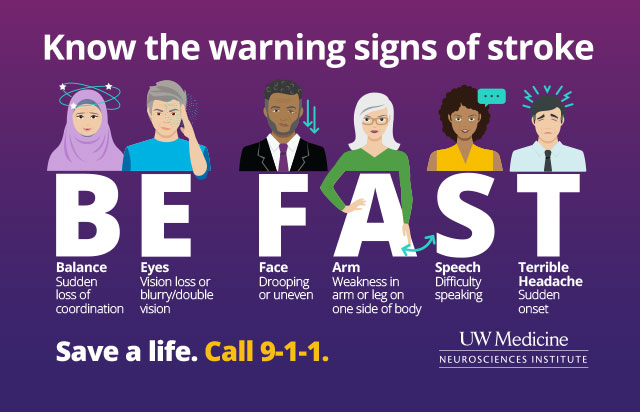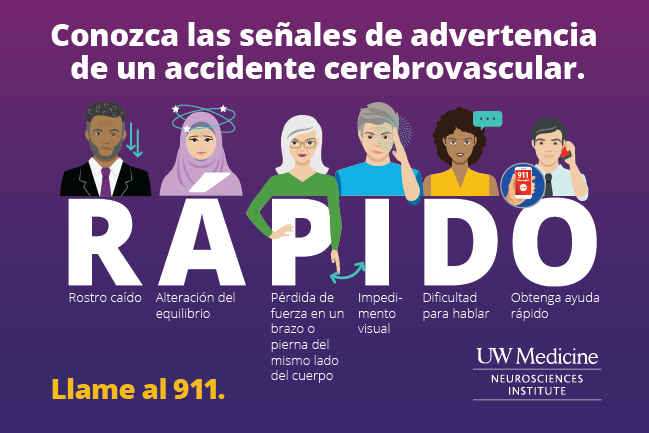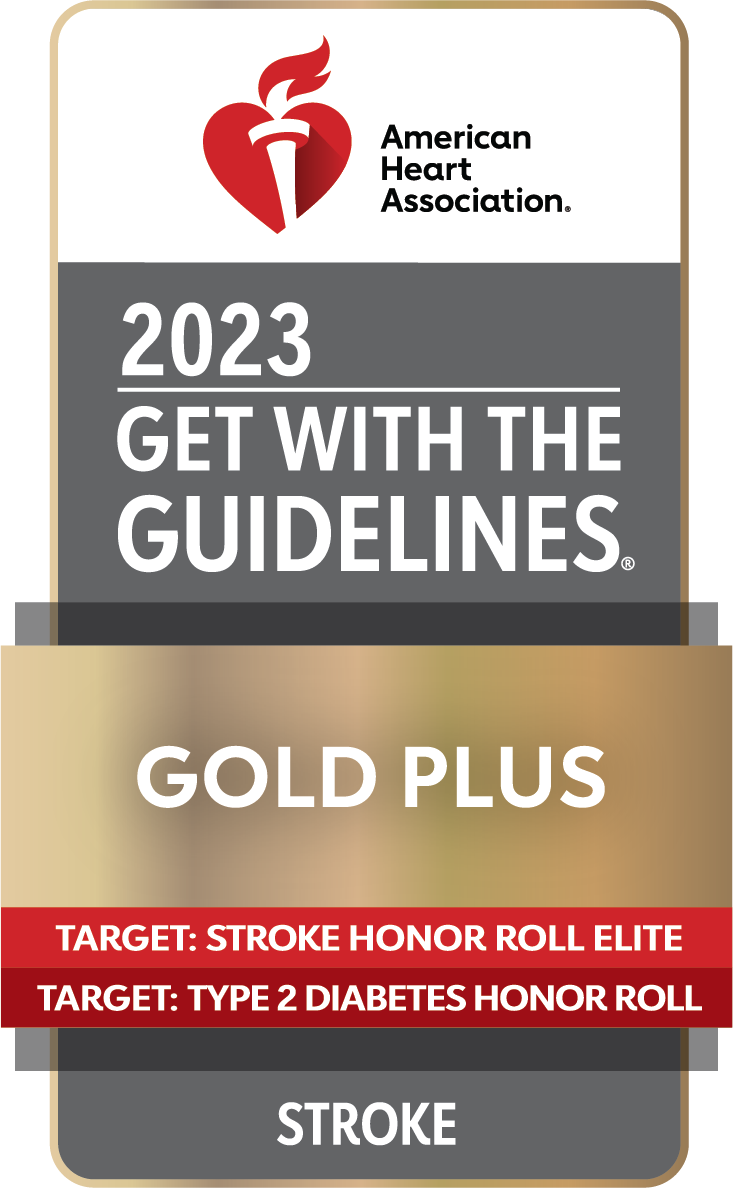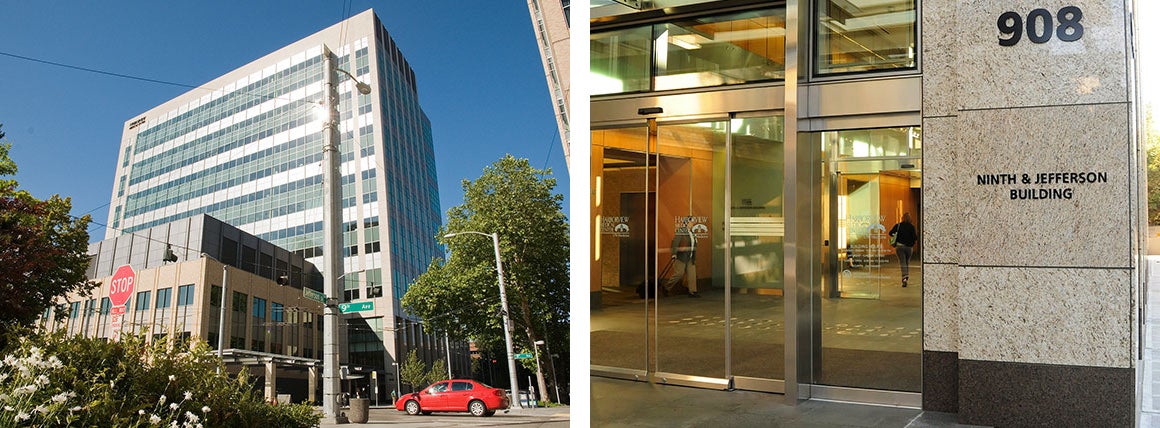UW Medicine’s commitment to stroke treatment
Each year, approximately 800,000 Americans suffer a stroke. The faster you receive treatment following a stroke, the better your chances of survival and recovery. At UW Medicine, our stroke care experts and emergency departments are ready to respond 24/7 with treatments that can save your life and prevent disability. By providing patients with the highest quality care, from diagnosis to rehabilitation, our care shows that when minutes count, you can count on UW Medicine.
Know the warning signs of stroke

When every second counts, BE FAST to protect your brain.
Symptoms of a stroke typically appear as face drooping, arm weakness and slurred speech, among other symptoms. Timing is critical: There is a small window of time to treat strokes.
Warning signs:
- B - Balance
- E - Eyes
- F - Face drooping
- A - Arm weakness
- S - Speech difficulty
- T - Terrible headache
Call 9-1-1 immediately if you think you or your loved one is having a stroke. Do not drive to the hospital. It is safer and potentially faster for an ambulance to take you.
Conozca las señales

Reconocer los síntomas de un accidente cerebrovascular podría significar la diferencia entre la vida y la muerte. Llame de inmediato al 911 si cree que usted o su ser querido está teniendo un accidente cerebrovascular. No maneje hacia el hospital. Es más seg uro y potencialmente más rápido si la ambulancia lo lleva.
Award-winning stroke care in Washington
Harborview Medical Center earned the Get With The Guidelines®-Stroke Gold Plus Award — and the Target: Stroke Elite Honor Roll and Target: Type 2 Diabetes Honor Roll designation — from the American Heart Association (AHA). This confirms we comply with strict processes and procedures proven to improve stroke outcomes.
Our Comprehensive Stroke Center at Harborview Medical Center provides patients with the highest quality care, from diagnosis to rehabilitation. Our vascular specialists collaborate with specialists at UW Medical Center and Valley Medical Center, and hospitals throughout Washington, Alaska, Idaho, Montana and Wyoming to provide lifesaving care for patients who have suffered a stroke or transient ischemic attack (TIA) or who are at risk for stroke or TIA.

There are two kinds of stroke: ischemic and hemorrhagic.
This is the most common type of stroke and occurs when a blood vessel in the brain is blocked from either a blood clot or a buildup of fatty deposits and cholesterol. This buildup is called plaque. Chronic conditions, such as high blood pressure, high cholesterol, diabetes and atrial fibrillation, are the main risk factors for this type of stroke.
This occurs when a blood vessel in or around your brain bursts, spilling blood into nearby tissues. With this type of stroke, pressure builds up in the nearby brain tissue, which causes damage and irritation. This is a less common type of stroke, as only about 13 in 100 strokes are this type, but is usually more severe than ischemic stroke. The most common causes for this type of stroke are high blood pressure, aneurysms and blood thinners.
Top risk factors for stroke
- High blood pressure
- Heart disease or abnormal heart rhythm
- Diabetes
- Smoking
- Lack of exercise
- Obesity
- Old age
- Gender
- Heredity or genetics
- History of prior stroke
- Race
- Climate
Treatments
Treatment is most effective when started right away. Our emergency treatments and procedures after a stroke may include:
- Clot-busting medicines (thrombolytics or fibrinolytics)
- Medicines and therapy to reduce or control brain swelling
- Neuroprotective medicines
- Life-support measures
- Craniotomy
UW Medicine Stroke Club — a virtual stroke support group
This monthly support group is for stroke survivors, their family members and caregivers. It is designed to lay the foundation for recovery and transition into life after a stroke. Learn from UW Medicine stroke care team members about risk factors, social resources and life after discharge. No prior registration is needed.
This is a recurring meeting every second Tuesday of the month.
| Tuesday, January 14th | 6pm |
| Tuesday, February 11th | 12pm |
| Tuesday, March 11th | 6pm |
| Tuesday, April 8th | 12pm |
| Tuesday, May 13th | 6pm |
| Tuesday, June 10th | 12pm |
| Tuesday, July 8th | 6pm |
| Tuesday, August 12th | 12pm |
| Tuesday, September 9th | 6pm |
| Tuesday, October 14th | 12pm |
| Tuesday, November 18th* | 6pm |
| Tuesday, December 9th | 12pm |
* November’s meeting pushed to the following week due to Veterans Day.
Join the Zoom meeting instructions Virtual Stroke Club w Zoom instructions.pdf
Meeting ID: 778 829 3310
Questions? Call 206.744.3975 or email stroke@uw.edu
UW Medicine’s stroke care excellence

Harborview Medical Center is a designated Comprehensive Stroke Center (CSC) by the Joint Commission. The Joint Commission awards "comprehensive" status only to those centers that have demonstrated the ability to:
- Provide advanced stroke care and therapies around the clock for all stroke patients including those with the most complex stroke conditions
- Participate in a rigorous on-site review with a thorough examination of the program by the Joint Commission
- Consistently meet or exceed quality patient care outcome standards
- Maintain the significant differences in resources, staff and training that are necessary for the treatment of complex stroke cases
- Maintain a robust stroke care quality and safety review program
- Actively participate in stroke research
Harborview offers a full range of services, 24/7/365. In addition, Valley Medical Center and UW Medical Center - Northwest have earned Primary Stroke Center Gold Seal Certification. This means they are equipped to diagnose and treat most strokes quickly and safely, 24/7/365.
Remember, if you or a loved one is experiencing any signs of a stroke, call 911.
Our certified stroke center locations
Harborview Medical Center
Emergency Department
325 9th Ave, Main Hospital, Seattle, WA 98104
Stroke Clinic
908 Jefferson St, Ninth & Jefferson Building, 5th Floor, Seattle, WA 98014
Valley Medical Center
Emergency Department
400 S 43rd St, South Tower, 3rd Floor, Renton, WA 98055
Outpatient Stroke Rehabilitation/Outpatient Therapy Services
400 South 43rd St, Northwest Pavillion Ground Floor, Renton, WA 98055
UW Medical Center - Northwest
Emergency Department
1550 N 115th St, Main Hospital A-Wing, 1st Floor, Seattle, WA 98133
